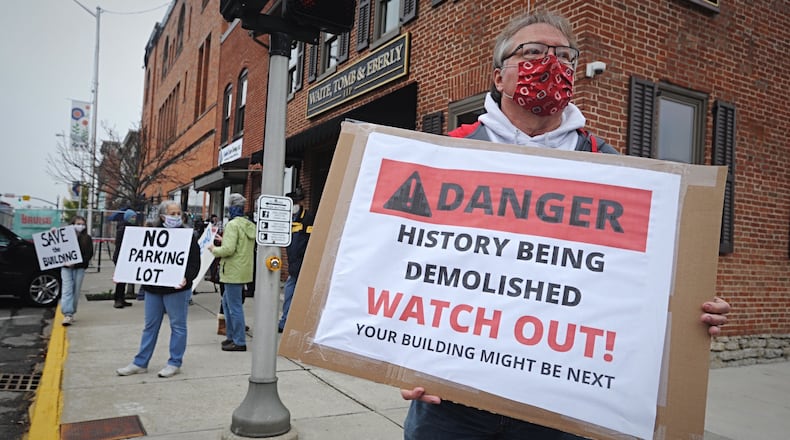The city staff will ask the commission to deny a request to demolish the structures built in 1840 and 1902 and known as the Tavern building because it thinks the rescue plan required for the site of any demolition is “less than desirable.”
Owner 116 W. Main St. LLC Randy Kimmel proposed a surface parking lot.
“Staff believes the rescue plan ... does not ‘mitigate any adverse effects of the proposed removal upon the property, the streetscape and the historic district.’” the staff said in its recommendation. “While this structure cannot cost effectively be saved, the property owner should resubmit with a rescue plan that replaces the current building with a similar structure acceptable to the commission.”
The staff’s opinion is that removing the structure and not replacing it “will leave an obvious gap in the streetscape.”
The gap in the streetscape was among arguments by demolition opponents when the demolition proposal was filed in the fall. Opponents rallied on the sidewalk near the building with signs urging people to support history and oppose demolition.
The three-story building at 112-118 W. Main St. was damaged in the January 2020 tornado that struck downtown Troy. The building was home to an early jail and courthouse and has hosted several well-known businesses over the years.
The Troy Historic Preservation Alliance said that eliminating the option of replacing the historic building with a parking lot is a step in the right direction.
“We would encourage the city to arrange for a more inclusive dialogue around options for saving this building. The planning commission should reject this application for demolition and, while additional options are explored, city officials should begin code enforcement actions against the building’s owner,” the THPA said in a statement obtained Monday.
The organization said the city-commissioned report found that the tornado likely only caused damage to the brick parapet and top of the north (front) wall of the building.
“This damage could be repaired at a relatively minimal cost, likely resolving the Miami County chief building officer’s finding that the building is unsafe. The city should require these repairs to be made,” the organization said.
“As we work together to maintain the architectural and aesthetic character of our community, we must also respect its history. Our downtown buildings provide a sense of place ... that sense of home that Troy so proudly embraces,” THPA said. “If we neglect to honor and respect this history, we risk losing what draws people not only to our vibrant downtown, but to our city.”
The demolition was proposed after the Miami County Building Department deemed the structure unsafe and a serious hazard. Rob England, chief building official, cited in a Sept. 23 letter findings in a structural engineer’s report that trusses and connections had failed, and load bearing masonry walls showed extensive deterioration. The letter ordered the building vacated and razed if not fixed in 60 days. The order was modified in January to remove the 60 days.
Demolition opponents argued the city was relying on a report by an engineer hired by the building owner. The city later hired Woolpert to review the analysis and the demolition request was tabled for that review.
While the request was tabled, staff and the Troy Development Council worked with the owner to evaluate options to demolition, according to the staff report.
Under the first option, the TDC attempted to buy the building contingent on more detailed estimates and securing financing to make repairs needed to stabilize the building. Also factored in were exterior façade repairs and first floor renovations for tenant use.
“Ultimately TDC was unable to obtain the financial commitments required to meet the basic cost estimates for the improvements, making the option to purchase and repair cost infeasible,” the staff report said.
A second option explored was to have the property owner obtain a “large” loan from the city to pay for basic structural repairs to stabilize the building. “However, the building owner was unable to secure future first floor tenants, which is needed to make a proforma work to fund the renovation costs and is a condition by the city for a loan,” the report said.
Contact this contributing writer at nancykburr@aol.com
About the Author
